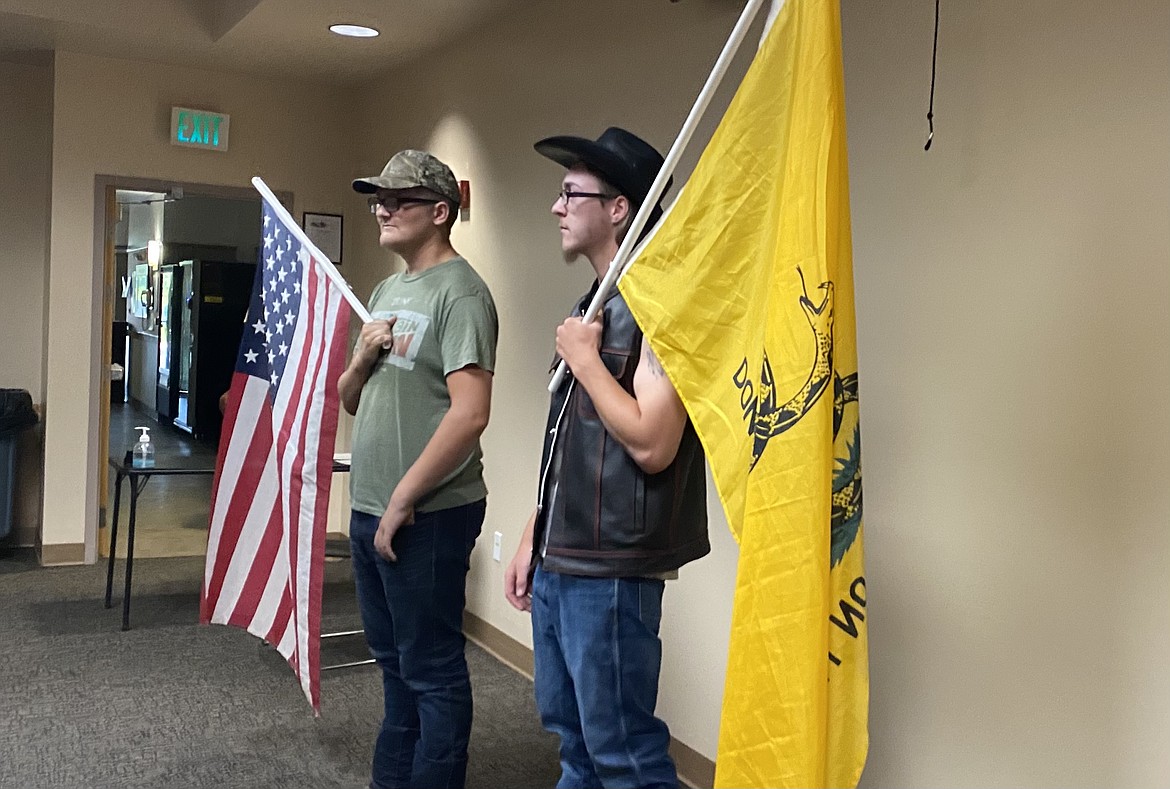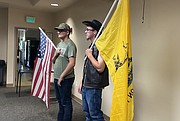Jackals, dogs and politics
COEUR d'ALENE — Commissioners Chris Fillios and Bill Brooks didn't hold back during their interview with the Optional Forms of Government study commission Wednesday night.
The study group is evaluating the effectiveness of the current structure of county government. One of five forms permitted under Idaho Code 31-5001, the three-member board of commissioners is being measured against the other four forms to see if there would be any benefit to alter the structure. The group will eventually make a recommendation that would then go to voters in the county.
Brooks said his drive to start the discussion stemmed from before his time as a commissioner. In comparison to his previous work experience, Brooks said, he realized that "having three commissioners didn't work very well."
The study commission was approved in a 2-1 vote by the commissioners earlier this year, Commissioner Leslie Duncan the lone opposition.
Since Brooks first rehashed the topic last October, he recognized that public members had expressed opposition to potential change. Brooks attributed the negativity to those who spread misinformation.
"People who are opposed to this from the beginning have behaved like a jackal attacking a zebra," Brooks said. "They want to kill it. So they all latch on thinking, maybe it'll bleed to death and fall. I'm hoping that doesn't continue to be the way some people view this endeavor."
A member of the study, Kristen Wing, asked Brooks and Fillios why the investigative process has received a considerable amount of "pushback, or concern, from the community for just doing something that we are legally able to do."
"I assume everyone here is here to do the best job possible," Wing said. "I don't understand why there needs to be almost intimidation at this point."
Brooks said those working against the study commission don't do so to discuss, but to disrupt.
"The hostility, the outbursts, and the refusal to let anybody else speak, they are like chihuahuas with microphones," he said.
That didn't go over well.
One of the primary concerns of critics is the possibility of creating a county manager or county executive position and making the sheriff, assessor, clerk, prosecuting attorney, coroner, or treasurer hired rather than elected positions.
"I think people believe that they're going to lose their right to elect officials. I don't believe that's the case," Fillios said. "I think the concern is primarily the sheriff, the prosecutor as well, but mostly the sheriff."
Fillios said that if a change is recommended by the group, it would likely be to increase the number of commissioners — from three to five or seven.
"But again, that is in your hands," he said. "If you decide that you want to leave the sheriff as elected, that's what goes to the public for the vote."
An argument in favor of making the six non-commissioner officials hired positions is that it could increase the qualifications of individuals. It also would permit an underperforming elected official to be fired instead of recalled, which Fillios said would "never succeed" because the bar is too high.
The "elephant in the room," according to Brooks, is "the ascendancy of the Republican extreme right-wing radicals" who are attempting to control the county. That comment immediately drew criticism from the crowd.
"You've crossed the line when you said that," one man in the audience yelled. "It is speculation."
A woman named Wendy stood up with a sign that said, "We want to speak for ourselves." No public comment has been accepted at any of the study commission meetings since its inception.
Brooks, who noted his recent disaffiliation with the Republican Party, wasn't done.
"A lot of people are very concerned that they will soon run the county. If we have a three-person commission, they only need one more commissioner, and they will be in control," Brooks said. "Now, I don't want liberal Democrats to do that either. I want a more balanced county commission."
Fillios stated what he believes the county needs is a county manager, five part-time commissioners, and that the six current elected officials should be hired. Brooks didn't express an opinion on a favored form of government.
When asked by study commissioner Tamara Bateson why Fillios felt the transition from elected to hired positions be recommended, he said it would improve the overall qualifications of officials. Fillios pointed out that the current three commissioners are the first board to all hold college degrees from four-year institutions — which he attributes to developed critical thinking, analytical abilities and enhanced work experiences.
"To run as an elected official for any county position in the state of Idaho, the requirement is living for one year and say 30 days in the county and be of 21 years of age," he said. "That's insufficient and frankly outdated."
Later Fillios noted that while hiring officials could play into accountability, the most considerable difference would be a qualification.
"If that individual is elected, how do you know you're getting the most qualified individual for that position?" he asked. "Who is going to review the resumes? Are the public going to do that?"
Both men explained further how if the board of commissioners were to increase from three, it would be more difficult for a political group to take "control" of the majority.
Brooks added that a manager's expertise might develop better systems within the county offices through field experience.
"You mentioned that people are fearful of losing the ability to elect their officials. Well, under the proposed government that you have a preference for, that's exactly what would happen," study commission member Bruce Mattare said.
"What if there's a problem with the commission under a government where we have a county manager? Who is holding them accountable?" Mattare continued. "Certainly not the county manager because he could lose his job."
The next study commission meeting is Wednesday at 5:30 p.m.



